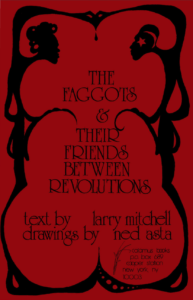 A new favorite. I didn’t know that all my life I’d been looking for a fable about queers loving and working together as they prepare to destroy the patriarchy. Or “the men” in Mitchell’s parlance:
A new favorite. I didn’t know that all my life I’d been looking for a fable about queers loving and working together as they prepare to destroy the patriarchy. Or “the men” in Mitchell’s parlance:
The first revolutions destroyed the great cultures of the women. Once the men triumphed, all that was other from them was considered inferior and therefore worthy only of abuse and contempt and extinction. Stories told of these times are of heroic action and terrifying defeat and silent waiting. Stories told of these times make the faggots and their friends weep.
The second revolutions made many of the people less poor and a small group of men without color very rich. With craftiness and wit the faggots and their friends are able to live in this time, some in comfort and some in defiance. The men remain enchanted by plunder and destruction. The men are deceived easily and so the faggots and their friends have nearly enough to eat and more than enough time to think about what it means to be alive as the third revolutions are beginning.
It’s a short book. Over the course of it, the faggots and their friends help each other stay alive and sane in Ramrod, a place run by the men. These friends include the women, the [drag] queens, the [radical] fairies, the faggatinas and the dykelets. Even the “queer men” who dress and walk among the men, “using all the tricks their fathers taught them” and at night go out and cruise the faggots.
One of the beautiful things about this book, which is full of beauty and wisdom and even pretty line drawings, is how generous it is with its spirit. It is easy as an out and proud faggot to hate on the closeted “queer men” in this book. I’ve done it myself: big vocal public anger at Larry Craig types who work to protect and maintain straight power, and then try to also reap the joys of queer sex.
You don’t get to have both unless everyone gets to have both. You pricks should be locked up for life.
Mitchell, as I’ve said, is more generous. Here’s how he ends the page on the queer men:
It’s the most beautiful book I’ve read about solidarity.
That it’s a book everyone should read doesn’t, probably, go without saying. Maybe isn’t readily apparent. If I’m making it seem like this book (from 1977 and out of print, but any easy googling will turn up a PDF) isn’t for you straight friends of us faggots, if I’m making it seem like something niche, or a relic, know that this book gave me the clearest lesson on what the patriarchy is, at heart, and not just why but how to fight it.
I’ll leave you with one more bit to inspire you, one I’m planning to hang over my desk at work:

